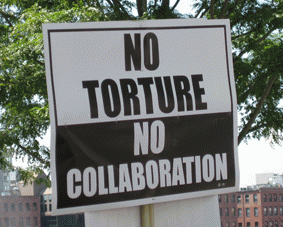Multiple reports, over a number of years, have confirmed the involvement of psychologists in the abuse and torture of war-on-terror detainees. Nevertheless, many members of the profession, the human rights community, and the broader public were stunned this past summer when an independent investigation uncovered an extensive history of collusion between leaders of the American Psychological Association (APA) and officials at the Department of Defense (DoD). As revealed in the July 2015 Hoffman Report, these secret dealings served to protect the participation of psychologists in national security operations and subverted the profession's commitment to beneficence, nonmaleficence, and do-no-harm ethics.
But those accustomed to power and deference rarely react well to evidence that undermines their authority or calls into question their actions. So it is not surprising that a small, vocal cadre of psychologists -- some with direct ties to the detention and interrogation operations of Bush, Cheney, and Rumsfeld -- are now pursuing an aggressive campaign to discredit the Hoffman Report. The report's revelations threaten their reputations, their influence within the APA, and potentially their standing with fellow military psychologists and the DoD.
This is a campaign that should be neither ignored nor discounted. If successful, it will obstruct an already rugged path toward accountability and reform within the APA, and it will hinder a long overdue examination of the profession's ethics in national security settings. But before turning to the campaign itself, it is useful to briefly summarize the Hoffman Report's key findings.
Key Findings
In November 2014, even while asserting that they had already refuted claims of wrongdoing, the APA Board hired attorney David Hoffman and his team from Sidley Austin to determine whether there was "any factual support" for allegations of collusion between representatives of the APA and Bush Administration. After a seven-month investigation with over 150 interviews and review of thousands of emails and other documents, the Hoffman Report found extensive evidence of such collusion.
Of particular interest, the report provides details about how military psychologists Morgan Banks, Debra Dunivin, and Larry James secretly collaborated with former APA Ethics Office Director Stephen Behnke -- and other APA senior staff and elected leaders -- in a coordinated effort to ensure that the APA's ethics policies did not constrain the DoD's use of psychologists in its detention and interrogation operations.
According to the Hoffman Report, despite a clear vested interest in the outcome, Guantanamo BSCT psychologist Dunivin covertly guided Behnke and other APA leaders on the selection of members for the APA's controversial Presidential Task Force on Psychological Ethics and National Security (PENS). Both Banks and James were chosen for that task force, which was stacked with military intelligence personnel. Banks then worked behind the scenes with Behnke and others to ensure that the PENS Report would support a DoD policy document that had already been drafted -- by Banks and Dunivin themselves. The report also describes how, at various times thereafter, Banks, Dunivin, and James collaborated secretly with Behnke and his colleagues in developing and vetting statements and strategies designed to preserve the close alignment between APA and DoD policies, effectively disregarding the will of the APA's general membership.
This is merely a snapshot of the much more detailed evidence and analysis provided by the 500-page Hoffman Report, which some now seek to discredit -- apparently at least in part through a combination of intimidation, strategic deception, and obfuscation.
(Note: You can view every article as one long page if you sign up as an Advocate Member, or higher).






